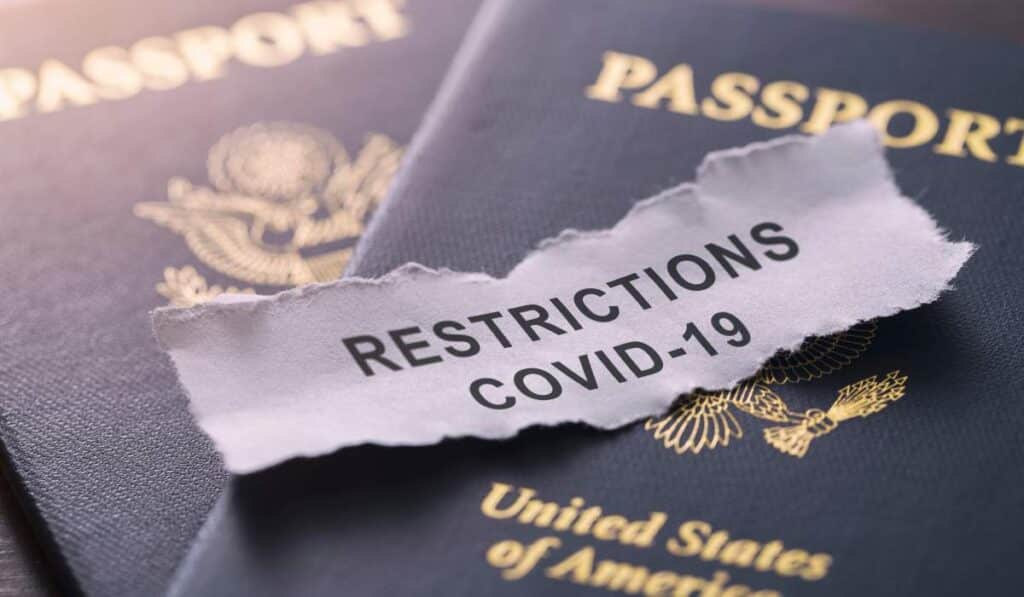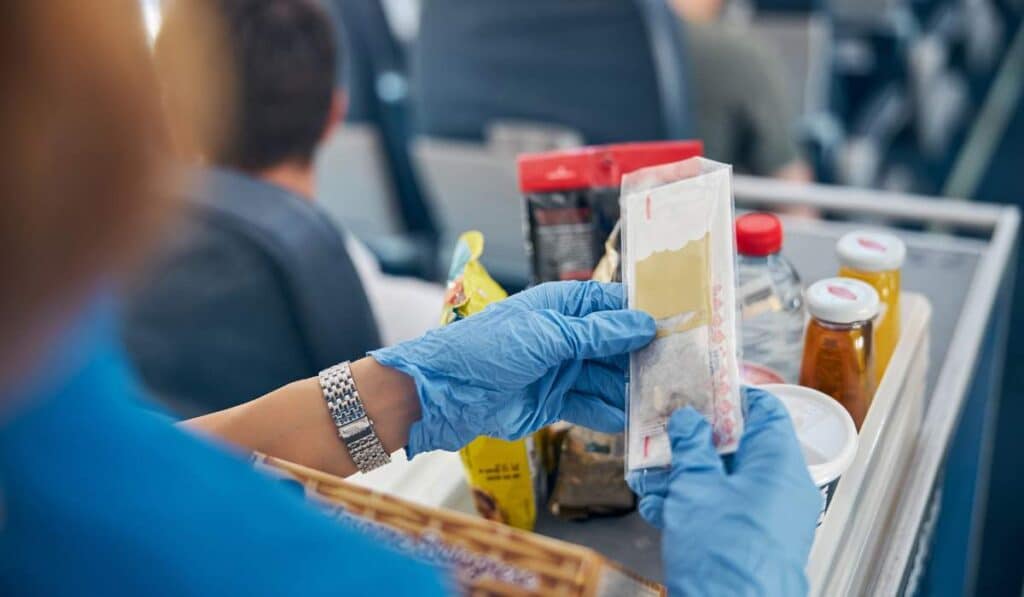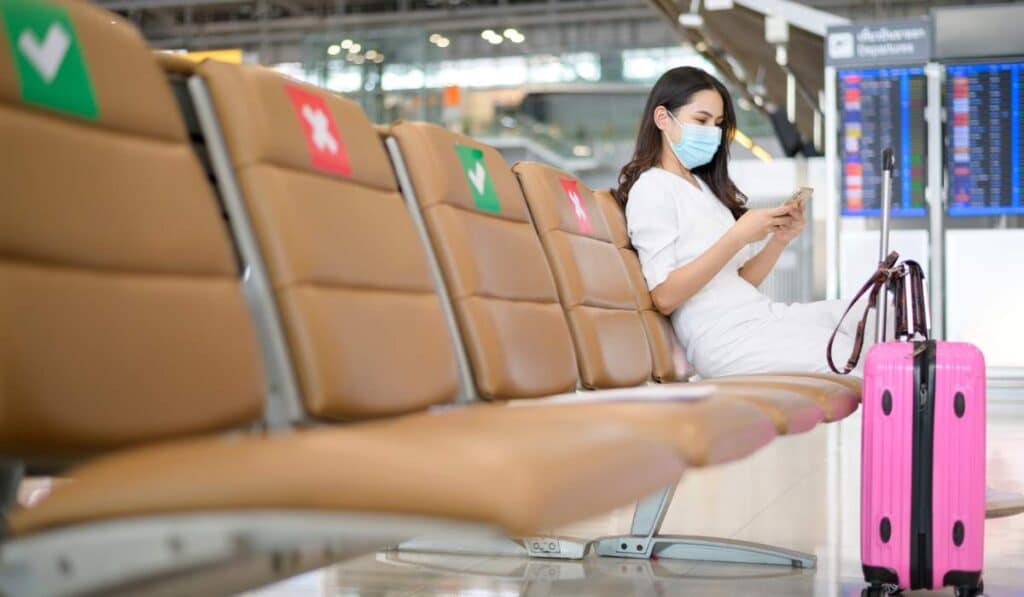Are you itching to pack your bags and hit the road after months of being cooped up at home? If so, you’re not alone. Revenge travel, a term coined for the phenomenon of travelers seeking to make up for lost time by taking extravagant trips post-pandemic, is on the rise.
Simply put, revenge travel refers to the surge in travel bookings and plans made by individuals who have been unable to travel due to COVID-19 restrictions. The term has gained popularity in recent months as vaccines become more widely available and people feel more comfortable traveling again.
But revenge travel isn’t just about making up for lost time; it’s also about seeking a sense of justice or retribution. After being forced to cancel or postpone their trips, many travelers are looking to take back control and get even with the pandemic by indulging in luxurious vacations.
So buckle up, grab your passport, and let’s dive into the world of revenge travel!
Why Revenge Travel is on the Rise Post-COVID

Pent-up demand for travel after lockdowns and restrictions
After months of being cooped up in our homes due to COVID-19 lockdowns and restrictions, people are eager to hit the road again. The pent-up demand for travel has been building up for over a year, and now that vaccines are available and travel restrictions are easing up, people are ready to satisfy their wanderlust.
Many individuals have been dreaming about traveling throughout the pandemic. With nothing much to do during lockdowns, they spent time browsing through travel blogs and social media accounts, planning their next trips. As soon as it became possible to travel again safely, they jumped at the opportunity.
Availability of vaccines and easing of travel restrictions
The availability of vaccines has played a significant role in encouraging people to plan their travels. With more than 3 billion vaccine doses administered worldwide as of September 2021, many individuals feel safer traveling now that they have received their jabs.
Governments around the world have also started easing up on travel restrictions as vaccination rates increase. Countries that were previously closed off to tourists are now opening up their borders with specific entry requirements such as proof of vaccination or negative COVID-19 test results.
Desire to make up for lost time and missed opportunities
COVID-19 disrupted many people’s plans; weddings got postponed, holidays canceled, and birthdays celebrated at home instead of in exotic locations. As a result, there is an urge among many individuals to make up for lost time and missed opportunities by taking revenge trips.
People want to celebrate milestones they missed out on during the pandemic or commemorate special occasions with loved ones finally. For example:
- A couple who had postponed their wedding may decide to go on a honeymoon abroad.
- Someone who had planned a trip with friends before the pandemic may revive those plans now.
- Parents may take their kids on long-overdue vacations to make up for the time they spent cooped up at home.
Increased savings due to reduced spending during lockdowns
During the pandemic, many people found themselves with extra cash due to reduced spending on things like dining out, entertainment, and commuting. With nowhere to go and nothing to do outside of their homes, people saved more money than usual.
Now that travel is becoming more accessible again, people have extra funds available for revenge trips. They may be willing to splurge a bit more on luxurious accommodations or upgrade their travel experiences since they have been saving up for so long.
The Benefits of Revenge Travel for Travelers and Businesses
Boost in mental health and well-being for travelers
After months of lockdowns, quarantines, and social distancing measures, people are eager to travel again. This pent-up desire to explore new places has given rise to the term “revenge travel.” It refers to the act of taking a trip after being deprived of travel opportunities due to pandemic restrictions.
Revenge travel can have significant benefits for travelers’ mental health and well-being. Studies show that traveling reduces stress levels, improves mood, and enhances creativity. It allows people to break away from their daily routines and immerse themselves in new cultures, experiences, and environments.
Traveling also provides an opportunity for self-discovery and personal growth. It challenges individuals to step out of their comfort zones, face their fears, and develop new skills. By embarking on a revenge travel journey, travelers can boost their confidence levels while creating lasting memories.
Economic benefits for businesses in the tourism industry
The tourism industry has been hit hard by the pandemic. However, revenge travel presents an opportunity for businesses in this sector to recover lost revenue. With more people willing to take trips again, there is a surge in demand for travel-related products and services.
Businesses that cater to tourists stand to benefit from increased customer traffic during peak seasons. They can adjust prices accordingly based on supply-and-demand dynamics while offering promotions or packages that appeal to revenge travelers’ preferences.
Increase in job opportunities within the industry
As businesses start seeing an uptick in customers due to revenge travel trends, they may need additional staff members or employees with specialized skills such as language proficiency or cultural knowledge. This influx of job opportunities within the tourism industry creates employment prospects for those who lost jobs during the pandemic or are looking for career changes.
Moreover, it offers an opportunity for professionals with transferable skills such as marketing or customer service experience to pivot toward the tourism industry.
Positive impact on local communities through tourism
Revenge travel can also have a positive impact on local communities. As more tourists visit an area, businesses in the region benefit from increased revenue. This economic boost can create opportunities for community development projects such as infrastructure improvements, job training programs, and cultural preservation initiatives.
Furthermore, revenge travelers often seek out authentic experiences that allow them to connect with locals and learn about their culture. This interaction between tourists and locals fosters cross-cultural understanding and appreciation while promoting sustainable tourism practices.
Planning a Revenge Travel Trip: Tips and Tricks

Researching destinations with open borders and low COVID cases
After a year of staying at home, travel plans are finally possible again. However, when planning your revenge travel trip, it’s important to consider the current COVID situation in your desired destination. Start by researching countries with open borders and low numbers of COVID-19 cases. Look for destinations that have implemented strict safety measures to ensure the health and safety of travelers.
Some examples of destinations that meet these criteria include:
- Iceland
- Costa Rica
- Greece
- Croatia
- Maldives
When researching your options, be sure to read up on any entry requirements or restrictions such as mandatory testing or quarantine periods.
Booking flexible accommodation options
In uncertain times like these, it’s important to book flexible accommodation options for your trip. Look for hotels or vacation rentals that offer free cancellations or allow you to change your reservation dates without penalty. This will give you peace of mind knowing that you can adjust your plans if necessary.
Consider booking through a travel expert who can help you navigate the ever-changing travel landscape and provide advice on the best accommodations for your needs.
Considering alternative modes of transportation
With many airlines reducing their schedules and implementing new safety protocols, consider alternative modes of transportation when planning your trip. Road trips are a popular option for those looking to avoid air travel altogether. If driving isn’t an option, look into train or bus routes that may be available at your destination.
For example, Amtrak offers scenic train rides throughout the United States while Flixbus provides affordable bus options throughout Europe.
Budgeting effectively for expenses
Traveling during a pandemic can come with unexpected expenses such as mandatory testing or additional insurance coverage. When budgeting for your trip, be sure to factor in these extra costs.
Consider using a budgeting app such as Mint or YNAB to keep track of your expenses and ensure that you stay within your budget. Look for ways to save money such as booking accommodations outside of popular tourist areas or cooking meals instead of dining out.
Planning itineraries with outdoor activities
When planning your revenge travel trip, consider including outdoor activities in your itinerary. Not only are these activities often safer than indoor options, but they also allow you to experience the destination in a unique way.
Some examples of outdoor activities include:
- Hiking
- Biking
- Kayaking
- Surfing
Look for guided tours or excursions that can provide expert advice on the best outdoor activities in your destination.
Seeking advice from locals
Finally, when planning your trip, seek advice from locals who have experienced the pandemic firsthand. Look for online communities or forums where you can connect with people who live in your desired destination. They can provide valuable insights into local safety measures and recommend off-the-beaten-path attractions that may be less crowded.
Popular Destinations for Revenge Travelers: Where to Go
Domestic destinations with outdoor activities such as national parks, beaches, etc.
The United States has a lot to offer. For those looking to enjoy the great outdoors, there are plenty of options available. National parks like Yellowstone and Yosemite offer breathtaking views of natural wonders such as geysers and waterfalls. The Grand Canyon is another popular destination for hikers and nature lovers alike. Beachgoers can head to Florida or California for some sun, sand, and surf.
Here are some examples of domestic destinations with outdoor activities:
- Yellowstone National Park
- Yosemite National Park
- Grand Canyon National Park
- Florida beaches
- California beaches
International destinations with relaxed entry requirements such as Mexico, Costa Rica, etc.
For those looking to venture further from home, there are many international destinations that have relaxed entry requirements. Mexico and Costa Rica are two popular options due to their proximity to the United States and warm weather year-round. Both countries offer beautiful beaches, vibrant cultures, and delicious cuisine.
Here are some examples of international destinations with relaxed entry requirements:
- Mexico
- Costa Rica
- Jamaica
- Dominican Republic
- Aruba
Cities with cultural attractions that were closed during lockdowns such as museums, galleries, etc.
Many people have missed out on visiting cultural attractions during the pandemic due to closures. Now that things are opening up again, revenge travelers may be interested in visiting cities known for their cultural offerings. New York City is a prime example with its world-renowned museums like the Metropolitan Museum of Art and the American Museum of Natural History. Paris is another city famous for its art museums such as the Louvre and Musée d’Orsay.
Here are some examples of cities with cultural attractions:
-
New York City
- Metropolitan Museum of Art
- American Museum of Natural History
-
Paris
- Louvre
- Musée d’Orsay
-
London
- British Museum
- National Gallery
Remote locations offering seclusion from crowds such as private islands or villas.
For those looking for a more secluded getaway, there are plenty of options available. Private islands and villas offer the ultimate in privacy and luxury. The Caribbean is a popular destination for those seeking an island retreat. There are many private islands available for rent, such as Necker Island owned by Richard Branson. For those looking for a villa experience, Tuscany in Italy offers breathtaking views of the countryside.
Here are some examples of remote locations offering seclusion:
-
Caribbean private islands
- Necker Island
- Petit St.
The Impact of Revenge Travel on the Travel Industry

Increase in Demand for Domestic and International Travel Services
The travel industry has been hit hard by the COVID-19 pandemic, but as vaccination rates increase and restrictions ease, there has been a surge in demand for travel services. This phenomenon is known as “revenge travel,” where individuals who have had to cancel or postpone their trips due to the pandemic are now eager to make up for lost time.
This increase in demand has led to a rise in domestic and international travel bookings. According to data from travel agencies and tour operators, there has been a significant uptick in bookings since the beginning of 2021. In fact, some destinations are experiencing record-breaking numbers of visitors.
To meet this increased demand, airlines, and other travel companies have had to adapt quickly. Many have added more flights and routes, while others have offered discounts and promotions to entice travelers. However, with supply chain disruptions affecting various industries worldwide, it remains uncertain how long these measures can sustain.
Changes in Consumer Behavior Towards More Sustainable Tourism Practices
While revenge travel may be driving demand for travel services, it’s important to note that consumer behavior towards sustainable tourism practices is also changing. As people become more aware of their impact on the environment and local communities when traveling, they are looking for ways to reduce their carbon footprint.
Travel companies are responding by offering more eco-friendly options such as carbon-neutral flights or accommodations that use renewable energy sources. Consumers are seeking out destinations that prioritize sustainability initiatives such as reducing plastic waste or protecting wildlife habitats.
Shift Towards Digitalization Within the Industry
The pandemic has accelerated the shift toward digitalization within the travel industry. With many consumers hesitant to book trips through traditional channels like brick-and-mortar agencies or over-the-phone reservations due to health concerns or lockdowns, online booking platforms have gained popularity.
As a result, many airlines and hotels have invested in their digital infrastructure to improve the booking experience for customers. This includes offering contactless check-in and payment options, as well as utilizing artificial intelligence and chatbots to provide personalized customer service.
Need to Adapt to Changing Regulations Regarding Health Protocols
The pandemic has also brought about changes in health protocols for travel. Governments worldwide have implemented various restrictions and requirements such as mandatory testing or quarantine periods for travelers entering their countries.
Travel companies have had to adapt quickly to these changing regulations, often implementing new policies at short notice. This can be challenging, especially when different destinations have different requirements, but it’s crucial for the industry’s survival.
Overcoming Challenges in the Wake of Revenge Travel
Ensuring Safety Measures are Implemented Effectively
As travelers begin to embark on their long-awaited revenge travel experiences, ensuring safety measures are implemented effectively is crucial. The COVID-19 pandemic has brought about a heightened awareness of health and safety concerns for both travelers and those who work in the travel industry. To address these concerns, many airlines, hotels, and other travel services have implemented new policies and procedures to ensure that travelers can enjoy their experiences with peace of mind.
One way that airlines are ensuring safety is by requiring masks to be worn throughout the duration of the flight. Some airlines have implemented social distancing measures by blocking off middle seats or reducing capacity on flights. Hotels have also increased their cleaning protocols and are implementing contactless check-in and check-out procedures.
Addressing Concerns about Overtourism at Popular Destinations
Revenge travel may lead to overcrowding at popular destinations, which can cause harm to local ecosystems and communities. It’s important for travelers to be mindful of this issue when planning their trips.
One way to combat over-tourism is by choosing alternative destinations that are less popular but still offer unique experiences. For example, instead of visiting crowded beaches in Bali or Phuket, consider exploring lesser-known islands like Lombok or Koh Samui.
Another option is to visit popular destinations during off-peak seasons or times when crowds may be smaller. This not only helps alleviate over-tourism but can also lead to a more enjoyable experience without the crowds.
Managing Expectations around Limited Availability due to Capacity Restrictions
Due to capacity restrictions put in place as a result of the pandemic, many travel services may have limited availability. This can lead to frustration for travelers who may have had specific plans in mind.
To manage expectations around limited availability, it’s important for travelers to plan ahead and book early when possible. This includes booking flights, hotels, and other travel services well in advance to ensure availability.
Another option is to be flexible with travel plans and consider alternative dates or destinations if availability is limited. This can lead to discovering new experiences that may not have been considered before.
Balancing Economic Recovery with Environmental Sustainability Goals
As the world begins to recover economically from the pandemic, it’s important for the travel industry to balance economic recovery with environmental sustainability goals. Travel can have a significant impact on local ecosystems and communities, so it’s important for travelers and the travel industry as a whole to prioritize sustainable practices.
One way that travelers can contribute to environmental sustainability is by choosing eco-friendly accommodations and activities. This includes staying in hotels that have implemented sustainable practices such as energy-efficient lighting and water conservation measures. It also means participating in eco-friendly activities such as hiking, biking, or exploring nature reserves.
The travel industry can also contribute to environmental sustainability by implementing sustainable practices throughout its operations. This includes reducing waste, conserving energy, and supporting local communities through responsible tourism practices.
Embracing the New Era of Post-COVID Travel with Revenge Travel

The pandemic has brought the world to a standstill and has impacted every aspect of our lives. One area that was hit hard is travel. With travel restrictions in place and fear of getting infected, many people have put their travel plans on hold. However, as vaccines roll out, people are eager to get back to traveling. This eagerness has given rise to a new phenomenon called “Revenge Travel.”
Revenge Travel refers to the surge in bookings and trips that people are planning after being cooped up at home for so long due to the pandemic. People are looking forward to making up for lost time by taking longer trips, splurging on luxury accommodations, and visiting off-the-beaten-path destinations.
Encouraging responsible and sustainable tourism practices
While it’s understandable that people want to make up for lost time, it’s important that they do so responsibly. The pandemic is not over yet, and we need to continue following safety protocols while traveling. We should also be mindful of our impact on the environment and local communities.
To promote responsible tourism practices, travelers can:
- Choose eco-friendly accommodations
- Reduce their carbon footprint by using public transportation or walking instead of renting cars
- Avoid single-use plastics
- Support local businesses by buying locally-made products
Promoting off-the-beaten-path destinations to reduce overcrowding
With revenge travel comes the risk of overcrowding popular tourist destinations. To avoid this problem, travelers can consider visiting lesser-known places that offer unique experiences.
Some examples include:
- National parks: Instead of visiting crowded cities or beaches, consider exploring national parks.
- Small towns: These towns often have rich histories and unique cultures that are worth experiencing.
- Islands: There are many islands around the world that offer secluded beaches and stunning natural beauty.
By promoting off-the-beaten-path destinations, we can reduce overcrowding and support local communities that may have been negatively impacted by the pandemic.
Supporting local businesses and communities through tourism
The pandemic has hit small businesses hard, including those in the travel industry. By supporting local businesses, we can help them recover from the economic impact of the pandemic.
Some ways to support local businesses include:
- Eating at locally owned restaurants
- Shopping at locally owned stores
- Staying at locally owned accommodations
By supporting these businesses, we can help them stay afloat and contribute to the local economy.
Fostering a sense of cultural exchange and understanding through travel
One of the benefits of travel is that it fosters cultural exchange and understanding. By experiencing different cultures firsthand, we gain a better understanding of other people’s perspectives and ways of life.
To foster cultural exchange, travelers can:
- Participate in cultural activities like cooking classes or traditional dance performances
- Learn about the history and customs of the places they visit
- Interact with locals to learn more about their way of life
By embracing cultural exchange, we can promote empathy and understanding across borders.
Conclusion
Revenge travel has become a popular trend in the post-COVID era, as people are eager to make up for lost time and missed opportunities. This type of travel offers numerous benefits for both travelers and businesses, including increased revenue and enhanced well-being. However, it also poses some challenges, such as overcrowding and environmental impact. To make the most out of your revenge travel experience, it is important to plan ahead, choose your destination wisely, and embrace the new era of post-COVID travel.
Frequently Ask Questions (FAQs)
Is revenge travel safe?
While there is no guarantee of safety when traveling during a pandemic, many destinations have implemented health and safety protocols to minimize the risk of transmission. It is important to follow these guidelines and take necessary precautions such as wearing masks and practicing social distancing.
How can I plan a successful revenge travel trip?
Start by setting realistic expectations for your trip and choosing a destination that aligns with your interests and budget. Research local regulations and restrictions beforehand, book accommodations in advance, and consider purchasing travel insurance for added peace of mind.
What are some popular destinations for revenge travelers?
Destinations that offer outdoor activities or remote locations have become increasingly popular among revenge travelers. Examples include national parks, beach resorts, rural areas, and small towns.
What impact does revenge travel have on the environment?
Revenge travel can contribute to over-tourism in certain destinations, which can lead to environmental degradation. To minimize your impact on the environment while traveling, consider choosing eco-friendly accommodations, using public transportation, or walking instead of driving or flying whenever possible.
How can businesses benefit from revenge travel?
Businesses that cater to revenge travelers can see an increase in revenue after experiencing losses during the pandemic. By offering flexible cancellation policies and implementing health protocols to ensure customer safety, businesses can attract more customers and build trust with their audience.

